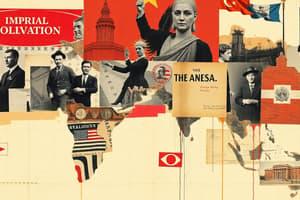Podcast
Questions and Answers
During the Victorian Era, Canadians were allowed to create their own laws without British influence.
During the Victorian Era, Canadians were allowed to create their own laws without British influence.
False (B)
What was the primary goal of the Women's Christian Temperance Union?
What was the primary goal of the Women's Christian Temperance Union?
- Imperialism
- Women's suffrage
- Nationalism
- Prohibition of alcohol (correct)
What was a major consequence for not following British laws during the Victorian Era?
What was a major consequence for not following British laws during the Victorian Era?
Harsh punishment, including the death penalty
The British declared the Lynn Canal an American river to avoid another war with _______________________.
The British declared the Lynn Canal an American river to avoid another war with _______________________.
Match the following groups with their primary goals:
Match the following groups with their primary goals:
What was the focus of the laws in Britain during the Victorian Era?
What was the focus of the laws in Britain during the Victorian Era?
What was the goal of the Women's Christian Temperance Union?
What was the goal of the Women's Christian Temperance Union?
What was the result of the British decision regarding the Lynn Canal?
What was the result of the British decision regarding the Lynn Canal?
What was the vision of imperialism in Canada during the Victorian Era?
What was the vision of imperialism in Canada during the Victorian Era?
What was the primary goal of French-Canadian nationalists?
What was the primary goal of French-Canadian nationalists?
What is the policy of one nation acquiring, controlling, or dominating another country or region?
What is the policy of one nation acquiring, controlling, or dominating another country or region?
What was the consequence of not following the law during the Victorian Era in Britain?
What was the consequence of not following the law during the Victorian Era in Britain?
Women were allowed in the Canadian army during World War I.
Women were allowed in the Canadian army during World War I.
What was the name of the terrorist group that assassinated Archduke Franz Ferdinand?
What was the name of the terrorist group that assassinated Archduke Franz Ferdinand?
The assassination of Archduke Franz Ferdinand led to Austria-Hungary declaring war on ____________________.
The assassination of Archduke Franz Ferdinand led to Austria-Hungary declaring war on ____________________.
Which country was in control of Canada when it entered World War I?
Which country was in control of Canada when it entered World War I?
Match the following countries with their goals in the Balkans region:
Match the following countries with their goals in the Balkans region:
The Schlieffen Plan assumed that Britain would stay neutral in the war.
The Schlieffen Plan assumed that Britain would stay neutral in the war.
What was the purpose of the War Measures Act?
What was the purpose of the War Measures Act?
What was the primary reason for the creation of the Indian Act?
What was the primary reason for the creation of the Indian Act?
Residential Schools were known for their high-quality education and healthy living conditions.
Residential Schools were known for their high-quality education and healthy living conditions.
What was the primary reason for Asian immigrants being accepted into Canada?
What was the primary reason for Asian immigrants being accepted into Canada?
The discovery of _______ in the Yukon will eventually increase the Canadian economy.
The discovery of _______ in the Yukon will eventually increase the Canadian economy.
What was the outcome of the trade unions' demands being refused by employers?
What was the outcome of the trade unions' demands being refused by employers?
Match the following terms with their definitions:
Match the following terms with their definitions:
Canada's economy was unaffected by the series of bank failures and stock market crash.
Canada's economy was unaffected by the series of bank failures and stock market crash.
What was the purpose of the head tax of $50 upon arrival for Asian immigrants?
What was the purpose of the head tax of $50 upon arrival for Asian immigrants?
Flashcards are hidden until you start studying
Study Notes
Suffrage and Nationalism
- Women had minimal rights in the early 20th century, including no right to vote, inability to divorce, and no control over their salaries.
- Nationalism refers to a strong attachment to a nation or culture.
Imperialism and Immigration
- Imperialism is the practice of taking over another country by force.
- Many Asian immigrants faced extreme discrimination, including being accepted into Canada only for cheap labor and having to pay a head tax of $50 upon arrival.
- The Indian Act was created to regulate the lives of Aboriginal people and free up land for settlers and immigrants.
Residential Schools and Discrimination
- Residential schools were run by the church, where Aboriginal people were forced to live apart from their families and assimilate into Canadian culture.
- Conditions in residential schools were unsanitary, and children were taken from their homes and punished for speaking their native languages.
Canadian Economy
- Canada had an abundance of natural resources, including timber, wheat, and minerals.
- The discovery of gold in the Yukon increased the Canadian economy.
- Canada started using hydroelectric power stations, which allowed for cheaper and more efficient production of goods.
- A recession eventually occurred due to a series of bank failures and a stock market crash.
World War I
- 5 causes of World War I: militarism, alliance, nationalism, imperialism, and the assassination of Archduke Franz Ferdinand.
- Militarism is a nation's policy of maintaining armed forces ready for war.
- Alliance refers to an agreement between multiple groups to work together in the event of war.
- Nationalism can sometimes lead to the promotion of deep hatred.
- Imperialism is the policy of one nation acquiring or dominating another country or region.
- The Black Hand, a terrorist group of Bosnian Serbs, assassinated Archduke Franz Ferdinand in protest of Austria-Hungary's control of Bosnia and Herzegovina.
Canada and World War I
- Britain was in control of Canada when it entered World War I.
- Prime Minister Borden promised 25,000 soldiers to Britain.
- Women were not allowed in the army, and Aboriginals, Japanese, and Africans were reluctantly allowed into the Canadian army.
- The War Measures Act gave the federal government emergency powers during wartime, including the right to detain people without laying charges.
Schlieffen Plan
- The Schlieffen Plan was Germany's plan to send soldiers to attack and defeat France while keeping Russia away.
- The plan had two assumptions: Russia would take too much time preparing for an attack, and Britain would stay neutral.
- Both assumptions failed, as Russia was already prepared for a German attack, and Britain was allied with France.
Social Climate of the Victorian Era
- Canadians were subject to British laws, which emphasized moral strictness and respect for authority
- Failure to comply with these laws could result in harsh punishments, including the death penalty
Women's Rights and Activism
- The Women's Christian Temperance Union advocated for prohibition laws, leading to significant social issues and illegal activities
- Women fought for suffrage (the right to vote), but were not recognized as individuals and had limited rights, including:
- Inability to divorce
- Inability to control their own salaries (which went to their husbands instead)
Canada-Britain Relations
- Despite having their own government, Canada relied on Britain to resolve international disputes
- A significant issue arose with Alaska, where the Lynn Canal was declared an American river by the British to avoid war
- Canada remained loyal to Britain, partly due to their shared vision of imperialism (expanding territory through force)
French-Canadian Nationalism
- French-Canadians sought recognition as Canadiens (French descendants of New France)
- They were devoted nationalists, attached to their culture and nation, and distinct from Canadian identity
Social Climate of the Victorian Era
- Canadians were subject to British laws, which emphasized moral strictness and respect for authority
- Failure to comply with these laws could result in harsh punishments, including the death penalty
Women's Rights and Activism
- The Women's Christian Temperance Union advocated for prohibition laws, leading to significant social issues and illegal activities
- Women fought for suffrage (the right to vote), but were not recognized as individuals and had limited rights, including:
- Inability to divorce
- Inability to control their own salaries (which went to their husbands instead)
Canada-Britain Relations
- Despite having their own government, Canada relied on Britain to resolve international disputes
- A significant issue arose with Alaska, where the Lynn Canal was declared an American river by the British to avoid war
- Canada remained loyal to Britain, partly due to their shared vision of imperialism (expanding territory through force)
French-Canadian Nationalism
- French-Canadians sought recognition as Canadiens (French descendants of New France)
- They were devoted nationalists, attached to their culture and nation, and distinct from Canadian identity
Studying That Suits You
Use AI to generate personalized quizzes and flashcards to suit your learning preferences.




